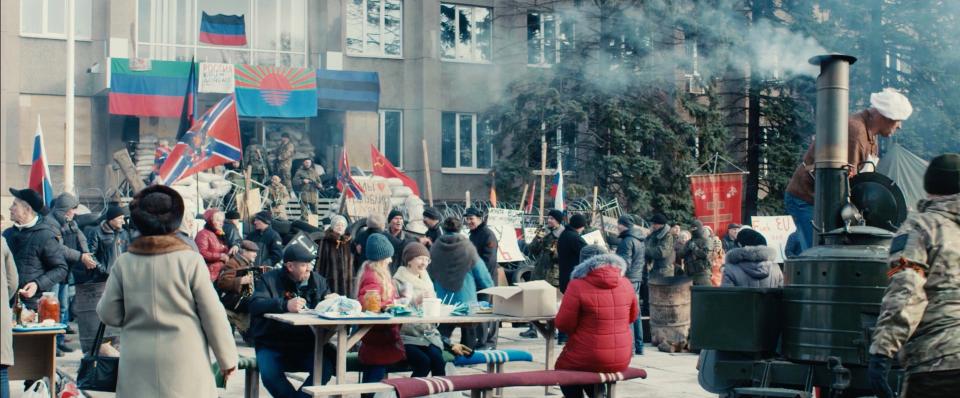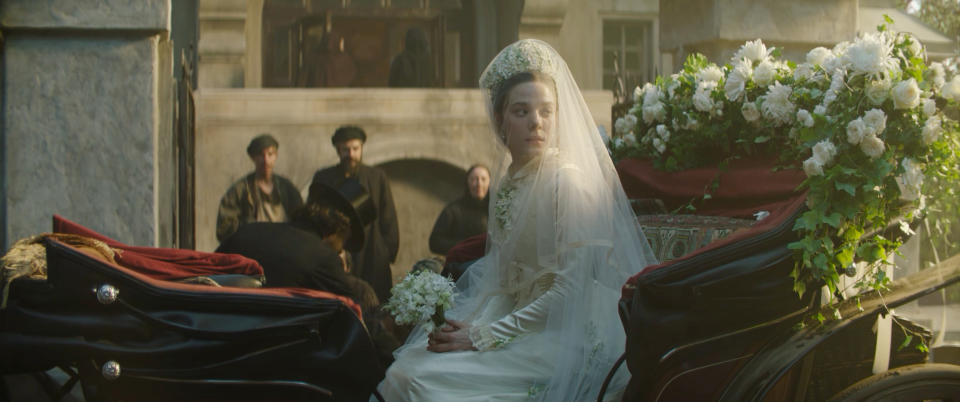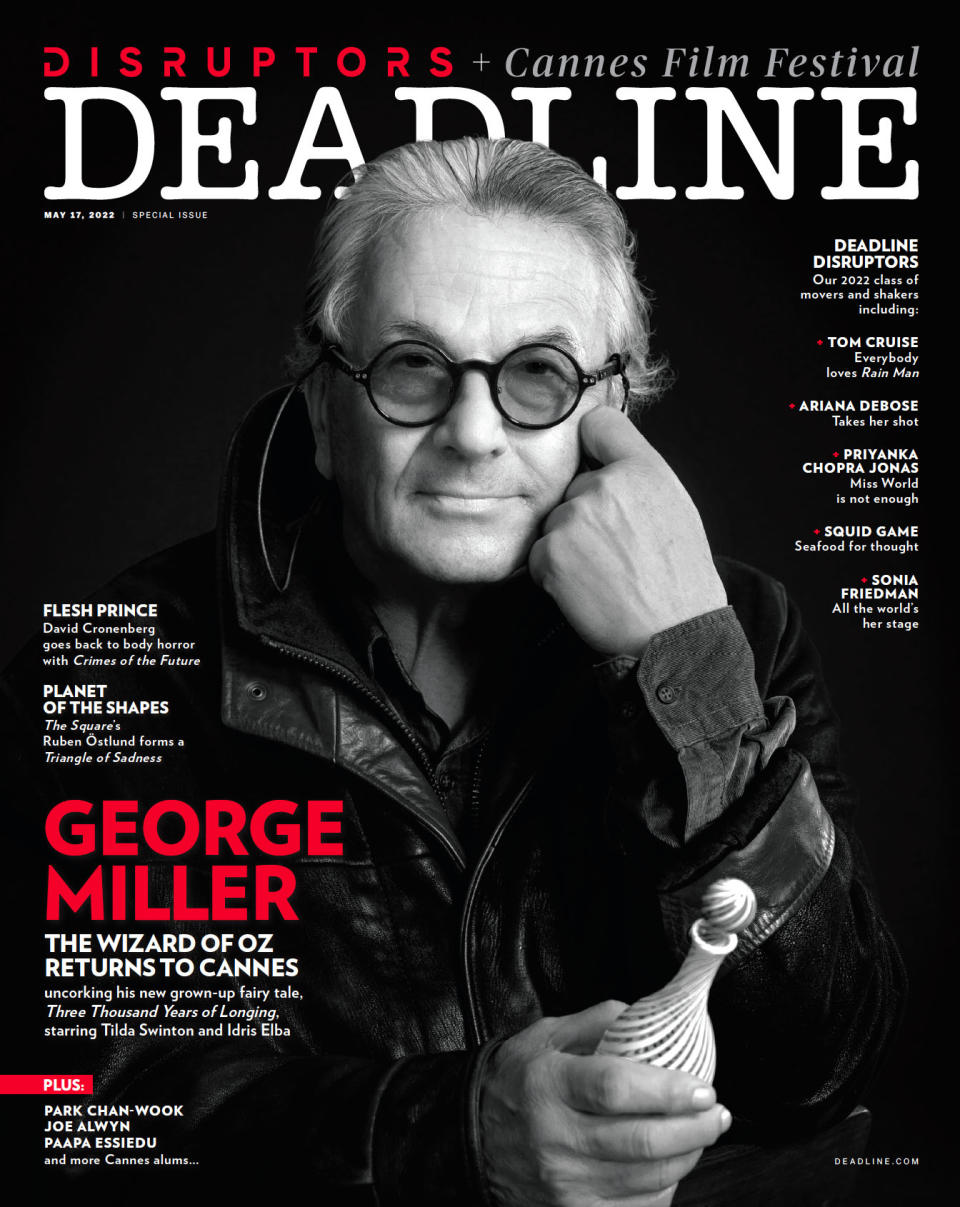Industry Veteran Denis Ivanov On The Fight To Preserve Ukraine’s Culture: “We Are Unique And We Are Not A Part Of Russia” — Deadline Disruptors
- Oops!Something went wrong.Please try again later.

Film producers are often used to facing challenging situations but for Denis Ivanov, he never could have anticipated the dramatic diversion his job would take when, on February 24th, Russia launched a full-scale military invasion of his home country.

More from Deadline
The Ukrainian producer-distributor, who has long been a regular fixture on the international festival circuit with credits including Oleg Sentsov’s Rhino and Sergei Loznitsa’s Donbass, now volunteers—like many other creatives in the country—for the local territorial army. Ivanov is driving or delivering ammunition, raising money internationally, helping transport drones, whatever may be needed on any particular day to facilitate the locals in fight against the continued onslaught of Vladimir Putin’s army on the country.
Speaking via Zoom from his office in the country’s capital of Kyiv where, at the time of the interview, Russian troops had fully withdrawn to focus on their offensive in eastern Ukraine, Ivanov appears calm and focused. He may not be fighting on the frontlines, but his battle is nonetheless important: he’s fighting to preserve Ukrainian culture.
“The war is not only about the military,” he says. “The first thing Russians are doing when they come into a town or village is they go into the library and take out all the Ukrainian books about our history. It’s not that they are just fighting for the land, they are fighting against our language and our culture. The world has often thought of Ukraine as part of the Russian-speaking world, but for us, we know we are not just that. We are now trying to make everyone understand that we are unique, and we are not part of Russia.”
The challenges ahead are admittedly arduous but if the last few months have shown the world anything, it’s that Ukrainians are tough, resilient and will fight fiercely to protect their heritage and homeland. Ivanov’s company, Arthouse Traffic, was one of the first film companies in the country to distribute and produce arthouse cinema when it was founded in 2003. It co-produced Myroslav Slaboshpytskyi’s 2014 Cannes Critics Week entry The Tribe and has since released more than 400 films. The company was also a founder and co-organizer of the Odessa International Film Festival from 2010 to 2013.
Now, with Russian troops out of Kyiv for the moment, Ivanov and his colleagues have already begun the process of rebuilding and trying to get locals back into cinemas.
“We’re trying to do some damage control because, in terms of cinemas, many have been destroyed,” he says. “In Kyiv, one of the most modern multiplexes was hit by a missile. But we’re getting back to work. It’s not about making money; it’s about getting the organization active and rebuilding.
“Of course, going to the cinema is not the first thing people are spending money on, but it’s important that we participate in this huge wheel and try our best to keep the economy going.”

Film Movement/Courtesy Everett Collection
During this year’s Cannes Film Festival, Ivanov will be urging international sales agents to help empower Ukrainian distributors by treating them as a separate entity from Russia, a major concern for the local sector there now. Ivanov says that 50 percent of content Arthouse Traffic buys is through Russian distributors because historically many global sales outfits, particularly ones with smaller teams, have preferred to deal with a bigger territory.
“This is a huge challenge for independent distributors like our company because we can’t buy from Russia now because of the sanctions,” he says. “We definitely need to rebuild everything, and it is a process but at the same time there is a big question mark as to how we will do it in the upcoming few years because there are certain restrictions.”
Film production, he says, is an even bigger challenge as he and his colleagues and contemporaries continue to find resources to finish films that we already in post-production when the war began.
For Ivanov, the time is now for Ukraine and its creatives to be forthright about the changes that need to be implemented for the country to break out of Russia’s shadow. Since the war broke out, the influential exec has been vocal about backing a proposed boycott of Russian films and has personally called upon all international film organizations and festivals to refuse to promote or accept Russian titles.
“It’s not about boycotting Russian filmmakers because many of them are in opposition with [Vladimir] Putin,” he says. “But this is about moving against a system that needs to be rebuilt. There are many great directors who are not pro-Putin but whose films are financed by Putin oligarchs or the Russian Minister of Culture so they’re part of the ecosystem that has seen Russia inflict a ‘special operation’ in Ukraine. We just want to stop the system, not the rational filmmakers, but the narrative.”
He hopes that “breaking the system” would in turn encourage Russian artists to examine their own narratives, which Ivanov believes are laden with stories exalting Russia’s role in World War II or plots with Russian soldiers winning in combat.
“Russian culture also needs to reinvent itself and it won’t be reinvented if it’s connected with institutions who are responsible for propaganda or oligarchs who support Putin,” he says.
In the run up to Cannes, Ivanov, who is part of the Cannes Market’s Producers Network, and his counterparts have been building a dialogue with the festival’s organizers to explain its opposition to some decisions the festival has made for its 75th edition. Notably he raised issue with the festival’s opening night film Z (Comme Z) from Michel Hazanavicius, which Ivanov has called a pro-war symbol of Russia’s invasion of Ukraine. Even the Ukrainian Institute issued an official letter to the festival regarding this, as ‘Z’ is considered a pro-war symbol in Russia. In response to this criticism, Hazanavicius has changed the film’s title to Coupez!.

Cannes Film Festival
While Ivanov notes the original name was surely a coincidence, there were huge ethical ramifications on the Russo-Ukraine situation. Ivanov has also been vocal about the inclusion of Kirill Serebrennikov’s Tchaikovsky’s Wife, which is screening In Competition this year, a title that is backed by Roman Abramovich’s $100 million film fund Kinoprime. The EU and the U.K. have imposed sanctions on Abramovich due to his close ties to Putin.
“Cannes is an important festival and the one everyone looks to,” he says, “so how they approach these topics will impact how other festivals and delegates handle things. It will be a domino effect.”

As Ivanov continues to fight the good fight, he’s quick to brush off any suggestion that he is one of the cultural heroes of the current Ukraine generation.
“My friends who are in the frontline risking their lives, they are the heroes,” he says. “We are all just trying to do what we can on the other front.”
It’s clear that Ivanov is proud of what Ukraine has built in terms of culture in just four decades of existence, and he, like so many of his countrymen and women, are devoted to building it further. He has been “overwhelmed” by the amount of solidarity the international film community has shown Ukraine, which has buoyed morale and resolve. He urges the wider film community to support screenings of Ukrainian films in their own countries and continue to give Ukrainian voices a space in local media.
“We are grateful for all of the small things because, believe me, they are very important to us,” he says. “What we don’t want to do is just be victims. Of course, we are in a very hard situation and while we are victims of the aggression, we want not only to survive but to develop as a nation and culture. Now is the time to find the partners for new projects to rebuild this system of sales in films as well as deliver our point of view on the Ukrainian-Russian relationship. We don’t want anyone to say, ‘You’re small Ukrainians.’ We are mighty.”
Best of Deadline
2022-23 Awards Season Calendar - Dates For The 95th Oscars, Emmys, Tonys & More
Disney-Fox Deal: How It Ranks Among Biggest All-Time Media Mergers
Sign up for Deadline's Newsletter. For the latest news, follow us on Facebook, Twitter, and Instagram.

